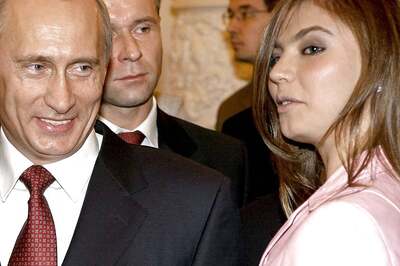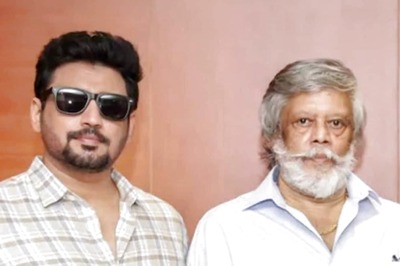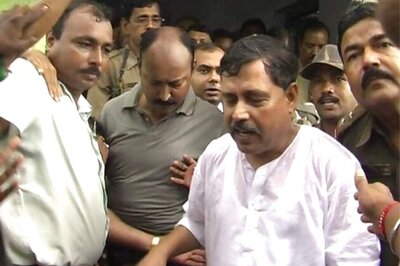
views
Cornered by India in the UN Security Council on supporting homegrown terror, Bilawal Bhutto, the frustrated foreign minister of Pakistan, made distasteful personal remarks against India’s Prime Minister Narendra Modi. He called PM Modi “the butcher of Gujarat” while responding to the comments made by India’s external affairs minister S Jaishankar where he targeted Pakistan for its terror backyard and globally wanted terrorists like Osama bin Laden being found and hunted there. In a highly objectionable remark, Bilawal said he wanted to tell India that bin Laden was dead but the “butcher of Gujarat” lives and he is the PM of India. For the record, Prime Minister Modi has received a clean chit in the Gujarat riots even from India’s Supreme Court. This uncivilised remark is a new low, even for Pakistan, says India’s foreign ministry.
Pakistan has always been an epicentre of terrorism, a terror haven, as perfectly defined by previous US President Donald Trump. He described Pakistan as a duplicitous country that saw the leaders of other countries as fools. Pakistan is a mendacious country that took more than $33 billion from the United States but in return gave only lies and deceit. It saw the US leaders as fools, took money from them in the name of helping it crack down on terrorists active in Afghanistan, and then cheated them by giving a safe haven to those very terrorists back home, said Trump.
Donald Trump’s remark followed what Hillary Clinton had said 11 years in Pakistan, a remark S Jaishankar quoted during a UN Security Council event in New York. Hillary’s blunt message to Pakistan’s leadership in a joint presser with then foreign affairs minister of the country, Hina Rabbani Khar, in October 2011 was, “It’s like that old story. You can’t keep snakes in your backyard and expect them only to bite your neighbours. Eventually, those snakes are going to turn on whoever has them in the backyard.”
Jaishankar was responding to a question on Pakistan’s recent allegations that India was behind rising terror activities in that country. The statement had come from Hina Rabbani Khar. Jaishankar recalled Hillary’s “snake” remark and advised Pakistan to check and control its own terror backyard rather than targeting India for it. “The world today sees Pakistan as the epicentre of terrorism. Now I know we’ve been through two-and-a-half years of Covid and a lot of us have brain fog as a result. But I assure you the world has not forgotten from where does terrorism emanate, who has their fingerprints over a lot of activities in the region and beyond the region. So I would say that it’s something which they should remind themselves of before indulging in the kind of fantasies which they do,” he said.
‘SPECIAL TERRORIST ZONES’
Hillary Rodham Clinton in her book “Hard Choices” in 2014 wrote on Pakistan’s homegrown terror, saying the time was “now” and the country needed to make hard decisions by shunning all terror groups and uprooting them from Pakistan’s soil. A report in the Pakistani publication Dawn quoted her saying, “Pakistan needs to make a hard choice now, disconnecting its ties to various terrorist groups and putting together all state powers to once and for all go after extremists, shut down their training camps, their safe havens, (and) madrassas that are inculcating suicide bombing behaviour.”
The terror network in Pakistan works like a back office for the ruling establishment. The country is replete with safe havens for terrorists, the areas that can be defined as “special terrorist zones”, a term coined by the Government of India recently.
The country is the creator of Afghanistan’s terror warlords or mujahideen (in the 1980s) and the Taliban (in the 1990s). Many dreaded terror groups like al-Qaeda, the Haqqani Network, Lashkar-e-Taiba, Jaish-e-Mohammed, and Hizbul Mujahideen run a state-supported parallel government in Pakistan that involves fund-raising, training, and terror export abroad.
Pakistan was the second home of the Taliban after it was uprooted from Afghanistan in 2001 in the war following the 9/11 terror attack. The country again nurtured and helped the Taliban to grow to become capable enough to retake Afghanistan. Together with the Taliban, it unleashed years of a terror war in the neighbourhood. Al-Qaeda chief Osama bin Laden was hunted down and killed in Pakistan only. Taliban chief Mullah Omar also died in Pakistan. It is a safe haven for UN-designated terrorists like Hafiz Saeed, Masood Azhar, and Zakiur Rehman Lakhvi. Indian gangster Dawood Ibrahim has become a terror warlord and a transnational smuggler in Pakistan even if he is proscribed by the United Nations Security Council.
Comments on Pakistan’s homegrown terror are not just external statements. Even the country’s former Prime Minister Imran Khan accepted this. Imran was Pakistan’s prime minister from August 2018 to April 2022. He accepted in July 2019, while speaking at the United States Institute of Peace in Washington that there were around 30,000 to 40,000 active terrorists in his country along with around 40 militant groups.
Pakistan’s religious seminaries or madrassas are used to radicalise and prepare terrorists. Anne Heckendorff, a research analyst at the European Foundation for South Asian Studies (EFSAS), during the 48th UN Human Rights Council session in October 2021 said madrassas were a breeding ground for terrorists. “The Taliban and the dreaded Haqqani network were born from such madrassas in Pakistan. Lashkar-e-Taiba, Jaish-e-Mohammed and other terrorist organisations continue operating such terror factories in Pakistan under the protection of the country’s powerful intelligence agency,” she said. Pakistan has currently over 30,000 madrassas with hundreds of them owned by terror groups.
Another benchmark that proves that Pakistan is a terror state is its lengthy presence on the FATF grey list.
PAKISTAN ON FATF GREY LIST
In the past 14 years, since 2008, Pakistan has been put thrice on the FATF grey list and each time it stayed there for a longer duration. FATF is an inter-governmental watchdog for global money laundering and terrorist financing. An FATF grey list presence means a country cannot control money laundering and terror-financing operations. It can also be interpreted as a country is not willing to put such a control network in place as terror is an unwritten part of its state policy, like in the case of Pakistan.
In such a scenario, access to international trade and finances is restricted and it becomes very difficult to get loans from multilateral organisations like the World Bank or the IMF. Being on the grey list is also a warning for an FATF black list migration which almost completely restricts access to the external financial system. It is followed by an international boycott.
Out of the last 14 years, Pakistan has been on the grey list for 9 years and 8 months. The first time it was put on the list was from February 28, 2008, to June 25, 2010, for two years, three months, and 28 days. The country failed to take corrective measures suggested by the FATF and was again put on the grey list from February 16, 2012, to February 26, 2015, or for three years and ten days. But even after this longer duration, it again failed. FATF, for the third time, put Pakistan on the grey list on June 28, 2018. It stayed there for more than four years this time and was recently moved out, on October 21, 2022. The duration of the grey list presence this time was four years, three months, and 23 days.
Given its terror track record, the world should not be surprised if Pakistan is pushed back to the FATF grey list again in the near future. It is ridiculous to see such a country accusing India, the world’s largest democracy and a successful one with a burgeoning economy and increasing global connectivity, of being a terror sponsor.
Read all the Latest India News here



















Comments
0 comment